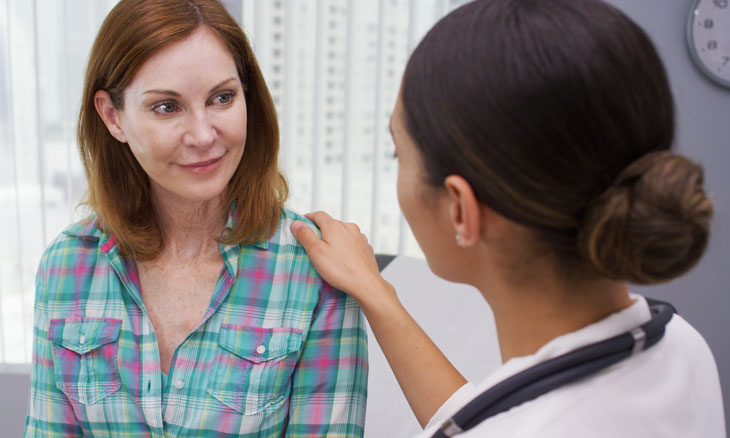
Women's Health
Women’s Health: Don't Skip Your Annual Exam
Simple but true: most women don’t look forward to their annual examination at the OB-GYN. It’s an uncomfortable visit, but it’s essential. Reiesha Graham, MD, explains why those yearly appointments are critical throughout our lifetime.
WHEN TO START:
The American Congress of Obstetricians and Gynecologists (ACOG) recommends that young women have their first visit with a gynecologist between the ages of 13 and 15 — after they start their menstrual cycle.
“For some teens, their first visit to a gynecologist can be intimidating,” said Dr. Graham. “Parents should help their daughters find a doctor who meets their needs and makes them feel comfortable.”
During the visit, Dr. Graham says that age-appropriate information regarding body image, sexuality, sexual activity, and future reproductive plans is discussed. The majority of teens won’t have an examination on their first visit unless there are symptoms that call for one like painful menstruation.
AS WOMEN GET OLDER:
By age 21, women should have a yearly pelvic examination, and begin screening for cervical cancer regardless of sexual activity. Because screening recommendations change from time to time, having a yearly appointment with your gynecologist is preferred.
“During an annual visit, I talk to patients about their reproductive health including menstrual cycle, body image, weight, and overall well-being,” said Dr. Graham. “Screening for cervical and breast cancer is an essential part of the conversation.”
Regular appointments shouldn’t be overlooked by those who are planning a family. “During pre-pregnancy visits, we do a thorough assessment of the patient’s risk factors,” said Dr. Graham. “We want to be prepared for and possibly reduce complications during pregnancy. Prenatal visits are essential to keeping mom and baby healthy. While postpartum checkups help us make sure mom and baby are doing well both physically and emotionally.”
WHEN WE MATURE:
Once menstruation ends, that doesn’t mean women can stop seeing their OB-GYNs. “Many problems can arise before and after menopause. There are a multitude of reasons why problems arise; no individual is the same, and no single treatment will work for everybody,” said Dr. Graham. “By continuing to see your OB/GYN, problems can be evaluated and treated correctly. Overall, the visits can improve a patient’s quality of life.”
BOTTOM LINE:
Building a relationship with your OB-GYN may help motivate you to keep up with your appointments. “It’s important to develop a good long-term professional relationship with patients. I watch them grow, and start families. Not a lot of medical specialties follow patients throughout their life. It’s really quite special,” said Dr. Graham.
Visit Bayhealth.org/Find-A-Doc to be matched with a Bayhealth doctor.
WHEN TO START:
The American Congress of Obstetricians and Gynecologists (ACOG) recommends that young women have their first visit with a gynecologist between the ages of 13 and 15 — after they start their menstrual cycle.
“For some teens, their first visit to a gynecologist can be intimidating,” said Dr. Graham. “Parents should help their daughters find a doctor who meets their needs and makes them feel comfortable.”
During the visit, Dr. Graham says that age-appropriate information regarding body image, sexuality, sexual activity, and future reproductive plans is discussed. The majority of teens won’t have an examination on their first visit unless there are symptoms that call for one like painful menstruation.
AS WOMEN GET OLDER:
By age 21, women should have a yearly pelvic examination, and begin screening for cervical cancer regardless of sexual activity. Because screening recommendations change from time to time, having a yearly appointment with your gynecologist is preferred.
“During an annual visit, I talk to patients about their reproductive health including menstrual cycle, body image, weight, and overall well-being,” said Dr. Graham. “Screening for cervical and breast cancer is an essential part of the conversation.”
Regular appointments shouldn’t be overlooked by those who are planning a family. “During pre-pregnancy visits, we do a thorough assessment of the patient’s risk factors,” said Dr. Graham. “We want to be prepared for and possibly reduce complications during pregnancy. Prenatal visits are essential to keeping mom and baby healthy. While postpartum checkups help us make sure mom and baby are doing well both physically and emotionally.”
WHEN WE MATURE:
Once menstruation ends, that doesn’t mean women can stop seeing their OB-GYNs. “Many problems can arise before and after menopause. There are a multitude of reasons why problems arise; no individual is the same, and no single treatment will work for everybody,” said Dr. Graham. “By continuing to see your OB/GYN, problems can be evaluated and treated correctly. Overall, the visits can improve a patient’s quality of life.”
BOTTOM LINE:
Building a relationship with your OB-GYN may help motivate you to keep up with your appointments. “It’s important to develop a good long-term professional relationship with patients. I watch them grow, and start families. Not a lot of medical specialties follow patients throughout their life. It’s really quite special,” said Dr. Graham.
Visit Bayhealth.org/Find-A-Doc to be matched with a Bayhealth doctor.
